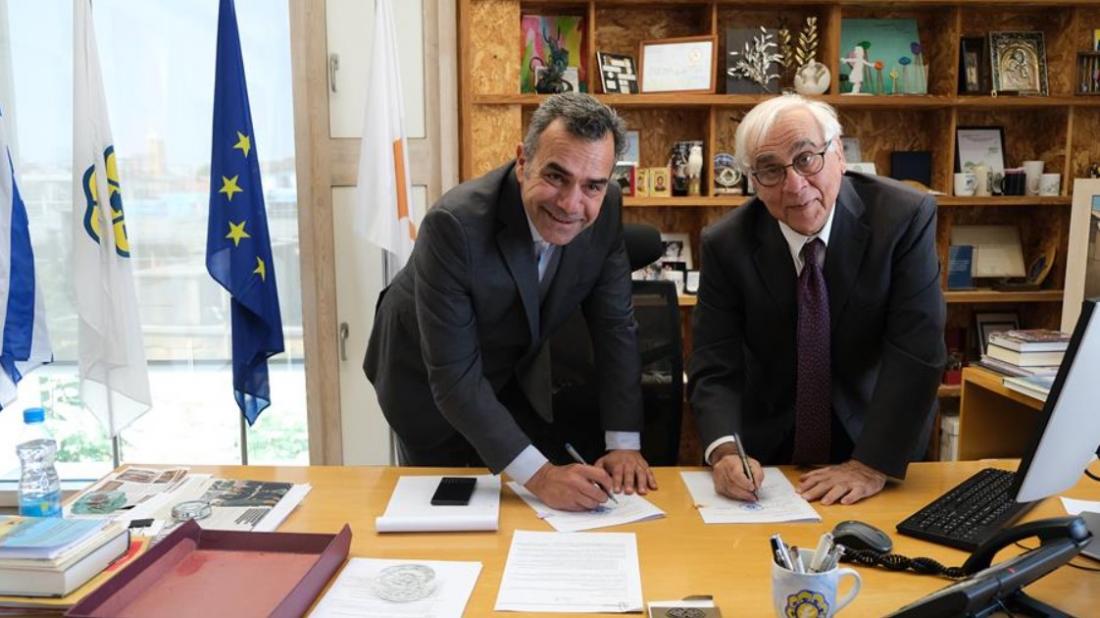BEEP: Nicosia Municipality commits to adopting energy efficiency in its buildings

The Cyprus Institute, SOLE partner in Cyprus, signed a Memorandum of Understanding (MoU) with the Municipality of Nicosia, agreeing to reinforce their collaboration on issues of common interest related to the adaptation of a Building Information Modeling (BIM) strategy to promote methods and good practises for the preservation and refurbishment of existing building and construction of new buildings.
The Cyprus Institute, in collaboration with the Municipality of Nicosia, participates in the BEEP project which developed an innovative methodology based on integration of digital technologies, tested in public buildings of cultural heritage, such as the proposed Municipal Museum on Markou Drakou Street. Among other actions related to architectural heritage, the main objective of this Memorandum of Understanding is to define a joint strategy between the Cyprus Institute and the Nicosia Municipality for the use of innovative digital methods and tools for the study, preservation and safeguarding of cultural heritage, especially in processes of renovation of buildings and optimization of their energy efficiency.
The signing ceremony was held at the Mayor’s office at the Municipality of Nicosia, οn Wednesday, October 26, 2022. The MoU was signed on behalf of the Municipality of Nicosia by its Mayor, Mr. Constantinos Yiorkadjis, and on behalf of The Cyprus Institute by its President, Prof. Costas N. Papanicolas. Attending the ceremony were also Assistant Vice-President for Strategy and Development, Dr Konstantinos Kleovoulou, Assistant Prof. Georgios Artopoulos, Ms. Myria Pilakouta, Municipal Secretary, and Mr. Costas Mavrokordatos, Architect of the Municipality.
The methodology of the BEEP Project incorporates the use of Building Information Modeling and Energy Simulation to pursue the optimization of the energy performance of buildings. This knowledge will provide the Municipality of Nicosia with a powerful method for the energy efficient renovation of cultural heritage buildings, offering innovative solutions to promote energy retrofit through the Energy Performance Agreement, a new strategy to be supported with private funds.
In a period where the sustainable use and reactivation of the historic center of Nicosia is one of the main objectives of the local authorities, a crucial factor for the successful revitalization of the city is the coordination of the relevant stakeholders, so that through the incentives offered to the owners of the building stock this important architectural heritage, which is threatened daily by the effects of neglect and climate change will be preserved and safeguarded.
About the BEEP project:
BEEP project aims at strengthening the use of Building Information Modelling (BIM) to enhance energy efficiency in buildings. The testing of this emerging technology on built heritage will be performed to demonstrate its scalability to the entire building stock. The project will provide public administrations with a powerful method for the energy rehabilitation of public buildings to be supported with private funds through the Energy Performance Contracting (*). The project main outcome will be an innovative methodology based on the integration of emerging technologies tested on 9 heritage public buildings located in Italy, Spain, Cyprus, Jordan, Palestine, Lebanon, and Egypt.
(*) Energy performance contracting (EPC) is a mechanism for organising the energy efficiency financing. The EPC involves an Energy Service Company (ESCO) which provides various services, such as finances and guaranteed energy savings. The remuneration of the ESCO depends on the achievement of the guaranteed savings. The ESCO stays involved in the measurement and verification process for the energy savings in the repayment period. ESCO and energy performance contracting are mostly found in the public sector and to a lesser extent in the industrial and commercial building sectors (Hilke and Ryan, 2012). Source: European Comission
Follow BEEP project: Web, Facebook, Twitter









